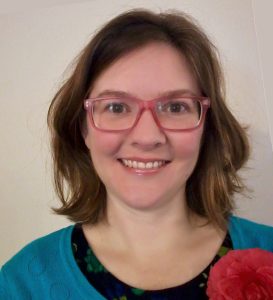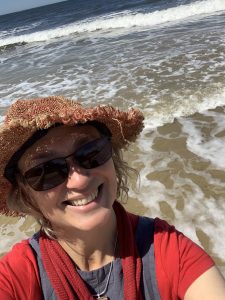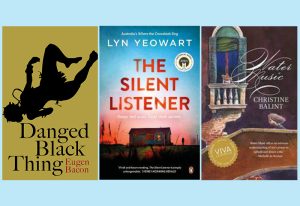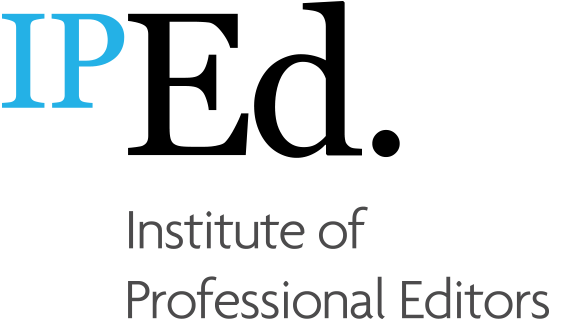From the president
I hope you’ve all enjoyed the end of summer, got some beach (or bush, or backyard) reading under your belt, and been able to nourish your creative and entrepreneurial spirits. I only managed one big book last month – Sarah Winman’s Still life, recommended – but have enjoyed pulling thin books and short story collections off the TBR shelves and catching up with authors from Djuna Barnes to Tony Birch, Krissy Kneen to Gabriel Garcia Marquez. Branch member Liz Atkinson reports on our branch books event in this issue, with further reading recommendations and tasters.
March means that tertiary courses are back up and running. Despite the convenience of online learning, there’s nothing like face-to-face classes and corridor conversations to create those “aha” moments. Our Projects and Outreach Officer, Caroline Arnoul, writes in this issue about support for editing students and student members. Caroline and our Student Adviser, Tim Loveday, are working on some further initiatives for later in the semester. Stay tuned for details.
As Victoria opens up, we were delighted to support members AJ Collins and Liz Atkinson in convening recent editors’ lunches in Melbourne’s southeast region and Geelong, respectively. Jane Fitzpatrick is also hosting a lunch in Fitzroy on Friday 25 March. If you would like to host a local get-together, please contact me – edvic.president@iped-editors.org – to discuss branch scheduling and support. Online member gatherings continue too. This month’s Zoom cuppa topic: “Building your fiction editing practice”.
Some members will be contemplating the forthcoming IPEd accreditation exam. Now’s the time to weigh up the benefits of accreditation, and if it seems worthwhile for you, plot out how best to prepare. IPEd is coordinating a strong program of exam-focused info sessions and skills workshops, and our branch offerings can supplement these.
Some great speaker events and workshops are also coming up. This month, Editors Victoria presents Sarah Grey speaking on healthy author–editor relationships, and we have training workshops planned on PDF mark-up (this month), grammar and indexing.
We are exploring other ways to support Victorian members through the accreditation process and hope to announce these shortly.
Happy editing!
By Stephanie Holt AE, EdVic President
New members
EdVic is pleased to welcome two new associate members who have joined since our last newsletter, Felicity Brand and Debra Wain.
We look forward to seeing you at our workshops and events and encourage you to make the most of IPEd’s networks for news and support.
New member profiles
Felicity Brand
Q: How long have you been an editor and how did your career begin?
A: I have been a technical writer for over 13 years and have been working as a freelance technical editor for the past two years.
Q: What type of editing makes up the majority of your work?
A: All my work is online, and I deal mainly with content for the software industry.
Q: What aspect of the profession do you find most challenging?
A: I love all aspects of the profession! I do find that it gets a bit lonely. I am a member of a large, active community of technical writers, and was wondering where all the technical editors are. By joining IPEd, I hope I’ve found some.
Q: How would you like to build your skills as an editor?
A: Right now, I’m looking into formalising my skills. I am keen to improve in any area I can.
Q: What are you looking forward to about being a member?
A: I am looking forward to meeting other editors (in person or online), and finding out more about the challenges that others face in this profession – and how they solve them.
Deb Wain
Q: How long have you been an editor and how did your career begin? 
A: I’ve been editing, mainly PhD and Masters theses, since completing my own PhD in creative writing in 2016.
Q: What type of editing makes up the majority of your work?
A: I have edited full fiction manuscripts, and academic chapters and papers, but mostly I work on thesis manuscripts.
Q: What aspect of the profession do you find most challenging?
A: I take great pleasure in ensuring that my editing helps to make the words that the academics and candidates have spent so many hours working on really gleam, but I find it tricky to remember all of the nuances of particular referencing styles. To mitigate this, I tend to keep reference notes on the citation and referencing style open as I work so that I can always check.
Q: How would you like to build your skills as an editor?
A: I’m currently working towards undertaking the IPEd Accreditation exam so, for the moment, I’m looking at honing all of my skills to ensure they’re up to snuff for this challenge. The main thing I need to work on is ensuring I can do the work fast enough for the exam.
Q: What are you looking forward to about being a member?
A: In other areas of my career, supporting organisations such as IPEd have been such a fantastic source of not only information and clarification but also support and friendship. That’s what I’m looking forward to here.
Report on December 2021 EdVic speaker event – Celebrating EdVic writers
 Editors Victoria speaker events usually involve a single speaker, but the end-of-year event on 9 December 2021, “Celebrating EdVic writers”, featured three of our editors who are also creative and highly engaging published writers. The online teleconferencing event took the form of a simulated mini book fair.
Editors Victoria speaker events usually involve a single speaker, but the end-of-year event on 9 December 2021, “Celebrating EdVic writers”, featured three of our editors who are also creative and highly engaging published writers. The online teleconferencing event took the form of a simulated mini book fair.
Before starting the formal part of the event, EdVic President Stephanie Holt provided an overview of the key events and issues of 2021. She reflected on the challenges we have all faced, and highlighted that the evening’s event was a celebration of fine writing and an acknowledgement of the hard work of those who have continued to edit and write.
Stephanie, as the event moderator, introduced the three guests: Eugen Bacon, Christine Balint and Lyn Yeowart, each of whom gave a short introduction about themselves and read a selection of their work.
Much of the discussion that followed focused on how their experience as editors helped, hindered or influenced their experience of writing. While sometimes a hindrance, it also helped them to improve their work, as they could draw on their editorial skills to polish and refine structure and content. The style and genre of the writing also influenced the extent to which their experience as an editor contributed to the quality of their writing.
For example, Eugen said she finds writing poetry, short stories, non-fiction or novels each requires a different mindset and process – each has its unique merits, but one form can borrow from the strengths of another.
Lyn said it was an absolute delight to work with an editor and to have the time to shape and refine her work. She found the process supportive and appreciated her editor’s feedback and ideas.
Christine spoke about how her personal experience as a choral singer influenced her ability to write in depth about a church in Venice.
This led to a discussion about how their experiences of being in other geographical places influenced the depth and breadth of their writing. Each writer drew on a wide range of sources for their work, including film, fiction, non-fiction and the internet for specific detail or gaining a ‘feel’ for a certain place or time.
Given the quality of the event, in retrospect, it may have been better to have been scheduled earlier in the year, but we are planning to repeat the format and look forward to many more panel discussions.
Many thanks to Eugen, Christine and Lyn for their time, contributions and candid discussions about their work. Thanks also to Stephanie for her outstanding moderation, Marie for her initiative and willingness to test a new format, and the production team for their wonderful behind-the-scenes work.
We look forward to seeing you all through 2022 at our monthly speaker events online and, when possible, face to face.
Dr Eugen Bacon PhD, an African Australian, is a computer scientist who’s been mentally re-engineered into creative writing with a focus on black speculative fiction. Her published works include Danged black thing, Saving shadows and Road to Woop Woop and other stories. Eugen has won multiple awards here and overseas. Her creative work has appeared in literary and speculative fiction publications worldwide, including Award winning Australian writing, British Science Fiction Association’s Vector magazine, Fantasy magazine, The Magazine of Fantasy & Science Fiction, with Bloomsbury Publishing and The year’s best African speculative fiction.
Dr Christine Balint PhD, is an academic teaching English and creative writing at Melbourne University. Previously, Christine taught in the Graduate Writing Program at RMIT. Her two historical novels, The salt letters and Ophelia’s fan, were published to international acclaim in 1999 and 2004 respectively. Her new novella, Water music, published by Brio Books, won the Viva la Novella IX in 2021.
Lyn Yeowart is a professional writer and editor with more than 25 years of experience in writing and editing everything from captions for artworks to speeches for executives. Her debut novel, The silent listener, is a psychological thriller with themes of family trauma, identity and truth, and a protagonist who loves words. It has been shortlisted for the 2022 Indie Book awards in the Debut Fiction category and optioned for a screen adaptation.
The following poem by Eugen Bacon (with an illustration by Elena Betti), titled “An Earnest Blackness”, is taken from Saving shadows, published by NewCon Press 2021.
There’s an animal tacked in my hair, and it hangs like a mirror I can’t see.
It’s full of silence, shadows, asking are we caged, or free? Sometimes
It licks my skin but doesn’t disturb me. When I reach up to touch it,
I can’t remember where it is, if it is. Perhaps it’s more cunning
Than I thought, hiding its pawprints. Patiently waiting to
Catch me with reflections of ebony nights, white stars,
Burnt-orange dust. I know and I don’t, the hum of
Rain on a tin roof. The taste of my grandma’s
Sweetened mangoes—moulded like
A donkey’s ear plucked fresh from
A tree that’s a silhouette above
My mother’s bones.
The following extract is from Christine Balint’s new novella, Water music, published by Brio Books, which won the Viva la Novella IX in 2021.
Later, after she took me home and fed me, Mamma unwrapped the swaddling to inspect me; it was not unusual for a foundling to be missing a limb or a finger. When she lifted me into the air and saw that I was fully formed, an unevenly cut rectangle of parchment fluttered to the floor. My birth mother had left me with half a carefully painted windchart showing the direction of the sirocco wind blowing hot and dry from the Sahara Desert. It was the wind that brought rain and storms; in the south it could bring blood rain. In Venice at high tide, the sirocco wind would bring acqua alta and a feeling of unease. For herself, my real mother had kept the ponente, the direction of the sunset and the tramontane, the north wind and anything foreign or strange. If she ever came for me, I would know her by the perfect reunification of the windchart, the two halves slotting together with a barely discernible seam as though they had never been separated.
The following extract from The silent listener by Lyn Yeowart (published by Penguin Random House Australia, 2021) is from the novel’s prologue. It’s written from the point of view of the protagonist who loves everything to do with words, books and even grammar.
It’s a simple farmer’s belt. Wait – allow me to clarify. Not the belt of a simple farmer, but a simple belt that belongs to a farmer. Correction: belonged. Past tense, which tastes delicious on my tongue.
The belt is made of plain black leather, and has a silver buckle with a silver tongue.
That’s how they’d describe it in, say, a criminal trial. But that’s only its outward appearance. More accurate for the defence counsel to say, with much emphasising and gesticulating, “Yes members of the jury, just an ordinary, simple farmer’s belt. But allow me to tell you what you can’t see when you look at this belt. This belt is thirty-five years long and two children wide, and old blood leaks out of every hole. Children’s blood. Run your fingers down it, and feel not leather, but pain. Hold it up to your nose and smell not leather, but fear. Bend it and hear not leather creaking, but children screaming.”
The people in the gallery would gasp, and the jury members would shake their heads, appalled.
If it ever got to trial.
By Liz Atkinson
Reaching out to editing students in 2022
As the new university year starts, it’s great to see that most universities and their editing students are heading back onto campus and face-to-face learning after two disrupted years of online learning.
What we learned during that time, though, was that the online environment can be useful for some purposes, particularly when it comes to networking and interacting with colleagues in other states or regional areas.
Late last year, Editors Victoria hosted a Zoom information session for editing students, which Jess Gately from Editors WA also attended.
Through that discussion, we realised many editing students know little about what is on offer through IPEd but would love to know more, and a Zoom session is a great way to provide an informal Q&A session.
Joining IPEd as a student can offer so much in the way of networking, mentoring, consolidating editorial skills and learning about the profession. Yet many students haven’t considered joining IPEd, seeing it as something that might be relevant after they’ve graduated.
So, in 2022, we’re working on changing that impression and taking IPEd to the students with Zoom information sessions planned for Semesters 1 and 2. The first session is planned for late March. If you’d like to know more, email Caroline Arnoul at edvic.outreach@iped-editors.org.
By Caroline Arnoul, Projects and Outreach Officer, EdsVIC
edvic.outreach@iped-editors.org
Forthcoming courses
After a slow start to the year, we are excited to have some Zoom workshops coming through the pipeline, including “Using PDF mark-up effectively with Kevin O’Brien”.
Using PDF Mark-up Effectively (series 1)
Date: Saturday 19 March 2022, 1.00 pm to 3.30 pm AEDT and Tuesday 22 March, 7.00 pm to 8.00 pm, AEDT
Location: online via Zoom
Book: here
Working together with Editors SA, we are pleased to be offering two repeats of this popular 2021 course on working with PDFs. In many branches of publishing, hard-copy mark-up is starting to become the exception rather than the norm. This course will teach you how to master on-screen mark-up, using the Comment tools in Adobe Acrobat, whether you’re annotating PDFs yourself or taking in changes from somebody else’s marked-up PDF.
Using PDF Mark-up Effectively (series 2 – repeat)
Date: Saturday 26 March, 1.00 pm to 3.30 pm AEDT and Tuesday 29 March 7.00 pm to 8.00 pm AEDT
Location: online via Zoom
Book: here
Grammar in a nutshell with Elizabeth Manning Murphy DE and Ted Briggs AE
Workshop 1: 1.00 to 4.00 pm AEST Friday 6 May and Friday 13 May 2022
Workshop 2 (repeat): 1.00 to 4.00 pm AEST Friday 24 June and Friday 1 July
Details: Did you learn the basics of English grammar? Can you explain to clients why you recommend edits to grammar in their text? Using a detailed workbook and activities, this workshop will help you to get your own writing right, and to explain the grammar of your editing corrections. It will be presented by grammar guru and academic editor, trainer and author Elizabeth Manning Murphy DE, with contributions by highly experienced technical writer, editor and IT specialist Ted Briggs AE.
This workshop will suit those preparing for the Accreditation exam in August, as well as experienced editors wanting to refresh or enhance their grammar skills.
Keep your eye out in late March for the email inviting you to book, and secure your place early to avoid disappointment.
Bookings: to open late March.
Your input
As always, we welcome suggestions for new training courses, as well as expressions of interest from anyone wishing to become a member on the Professional Development Subcommittee.
By Jane Fitzpatrick, Professional Development Officer
edvic.profdev@iped-editors.org

The Institute of Professional Editors Limited (IPEd) is the professional association for Australian and New Zealand editors.
News
We acknowledge and pay our respects to Aboriginal and Torres Strait Islander peoples as Traditional Owners, Custodians of Country and First Nations in Australia, and to Māori as tangata whenua and te Tiriti o Waitangi partners in Aotearoa New Zealand.
